In recent years, artificial intelligence (AI) has revolutionized various industries, and the world of mobile apps is no exception. AI has transformed the way mobile apps function, making them smarter, more efficient, and more engaging than ever before. From personalized recommendations to intelligent chatbots, AI-powered mobile apps are enhancing user experiences and driving innovation. In this blog post, we will explore how AI is shaping the future of mobile apps and the benefits it brings to both developers and users.
1. Personalized User Experiences:
AI enables mobile apps to understand and learn from user behavior, preferences, and interests. According to a study by SmarterHQ, 72% of consumers say they only engage with personalized messaging, while 86% say personalization plays a role in their purchasing decisions. By analyzing user data, including app usage patterns, search history, and social media interactions, AI algorithms can deliver personalized content, recommendations, and suggestions. Whether it’s a news app tailoring articles based on individual interests or a shopping app suggesting relevant products, AI helps create a more customized and engaging user experience.
2. Enhanced Efficiency and Automation:
AI algorithms can automate various tasks within mobile apps, saving time and effort for users. According to a survey by Gartner, by 2022, 70% of white-collar workers will interact with conversational platforms on a daily basis. AI-powered virtual assistants can handle voice commands, schedule appointments, send reminders, and even perform complex tasks like booking flights or ordering food. By leveraging natural language processing (NLP) and machine learning, these virtual assistants continuously improve their accuracy and understand user commands better over time.
3. Intelligent Chatbots:
AI-driven chatbots have become increasingly prevalent in mobile apps, enabling businesses to provide real-time customer support and improve user engagement. According to a study by Grand View Research, the chatbot market is expected to reach $1.25 billion by 2025. Chatbots can assist users by answering frequently asked questions, providing product recommendations, and even resolving common issues. Natural language processing and machine learning empower chatbots to understand user queries and respond appropriately, creating a conversational and interactive experience. Click Here to know more about chatbots.
4. Advanced Image and Speech Recognition:
AI has significantly improved image and speech recognition capabilities in mobile apps. Image recognition enables apps to identify objects, people, and even emotions, opening up possibilities for augmented reality, photo editing, and social media applications. Speech recognition, on the other hand, enables voice commands and dictation, making it easier for users to interact with mobile apps hands-free. These technologies enhance accessibility, convenience, and user engagement.
5. Predictive Analytics and User Insights:
With AI, mobile apps can leverage predictive analytics to anticipate user needs and provide proactive suggestions. According to a study by Evergage, 88% of marketers report seeing measurable improvements due to personalization. By analyzing user data, including past behaviors, location, and preferences, apps can offer personalized recommendations or reminders. Additionally, AI-powered analytics tools enable developers to gain valuable insights into user behavior, helping them refine their apps, improve user satisfaction, and make informed business decisions.
6. Efficient App Development:
AI-powered tools and frameworks are streamlining the app development process. From automated code generation to testing and debugging, AI assists developers at every stage, reducing development time and improving app quality. According to a survey by App Annie, 83% of developers believe that AI will be used to automate app development tasks by 2022. These tools also facilitate the integration of AI capabilities into mobile apps without requiring extensive coding expertise, making AI more accessible to a wider range of developers.
Conclusion:
AI has transformed the mobile app landscape, empowering developers to create smarter, more efficient, and engaging applications. By leveraging AI capabilities such as personalized user experiences, intelligent chatbots, advanced image and speech recognition, predictive analytics, and efficient app development tools, mobile apps can provide tailored content, enhance efficiency, and improve user engagement. As AI continues to advance, we can expect even more exciting developments in mobile app technology, further enhancing our digital experiences on the go.



